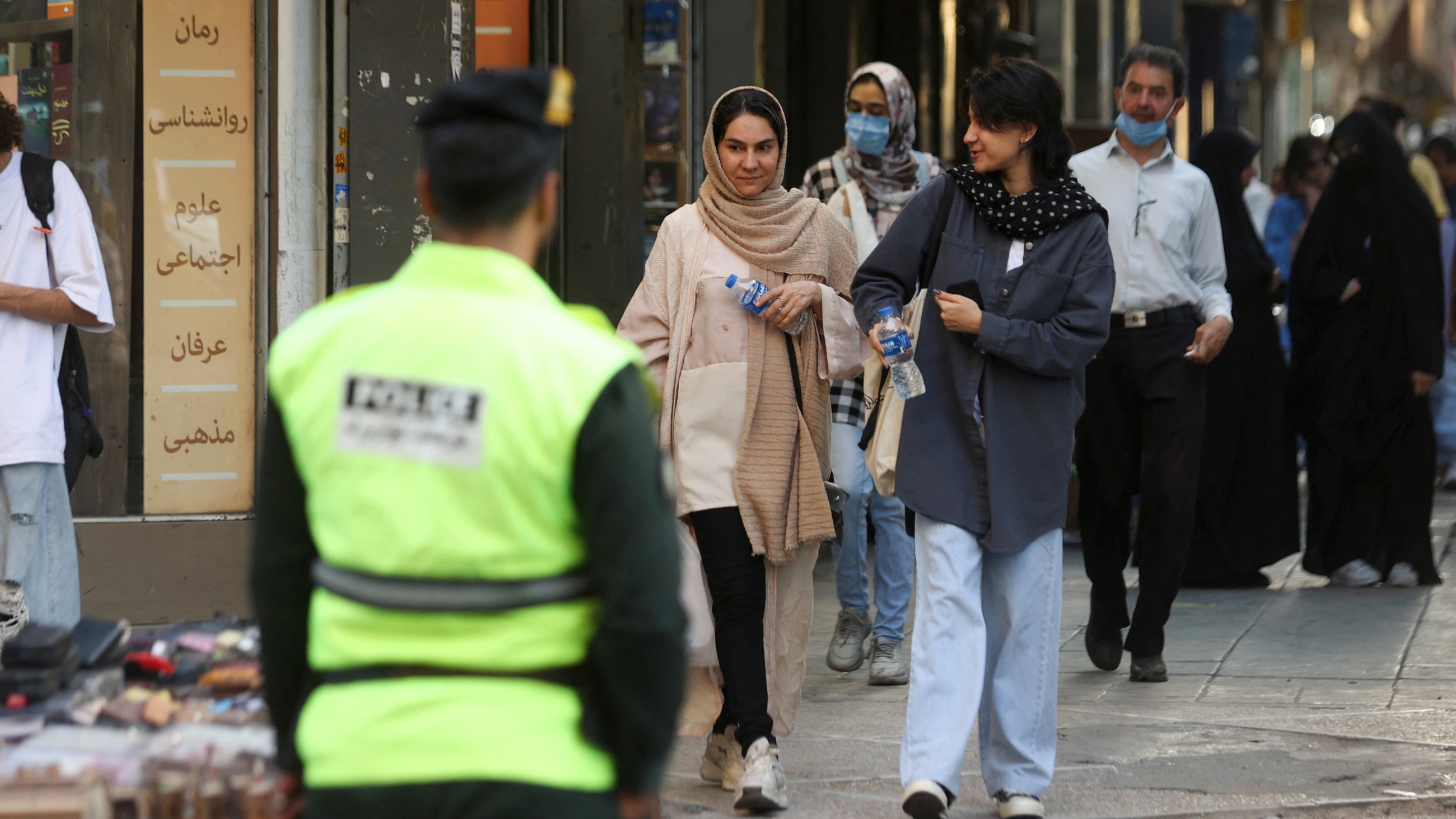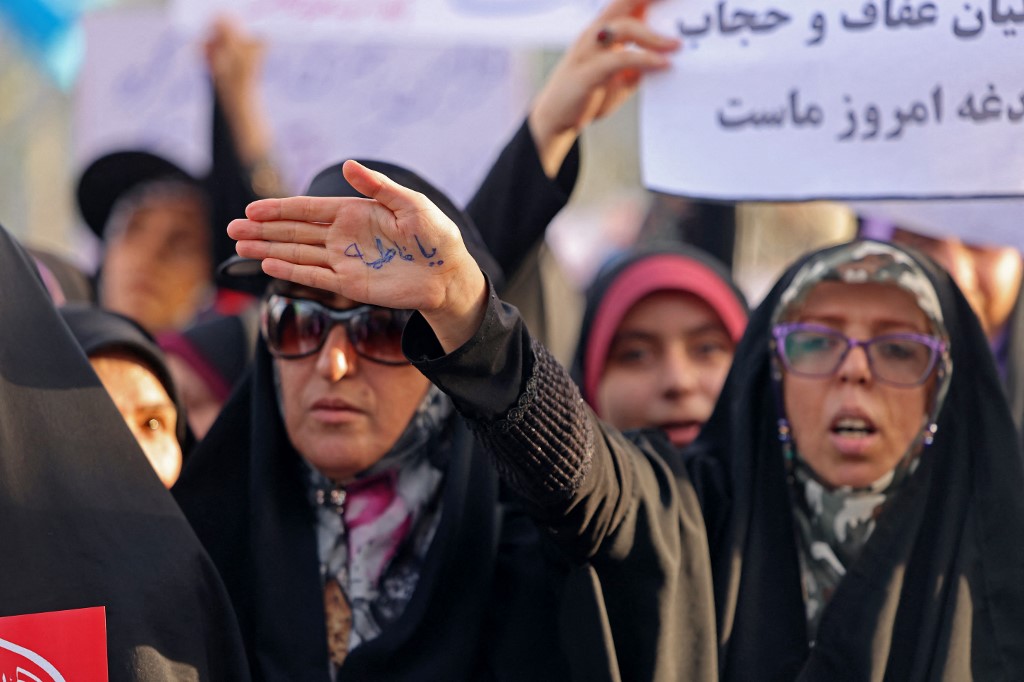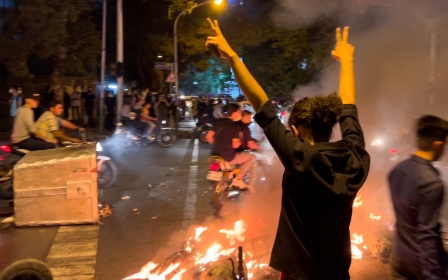Iran: Return of 'morality police' patrols met with shock and outrage

Many in Iran have been shocked after authorities brought back the controversial "morality police" to enforce strict dress codes on women.
The government has been criticised by observers who say the move could plunge the country into renewed unrest.
On Sunday, police spokesperson Saeid Montazeralmahdi said the force will resume car and foot patrols across the country to deal with individuals wearing what is deemed "unusual clothing".
The so-called "morality police" - officially known as Gasht-e Ershad or guidance patrol - suspended street patrols last year after they came under scrutiny, following the death of Mahsa Amini in their custody.
The 22-year-old was arrested over allegedly wearing her headscarf "improperly". Authorities said she died from pre-existing health issues - a claim her family disputed.
Stay informed with MEE's newsletters
Sign up to get the latest alerts, insights and analysis, starting with Turkey Unpacked
"Disobeying this police order could result in offenders being referred to the judicial system for punishment," Montazeralmahdi told local media.
A former Iranian official expressed his shock over the revival of the force and told Middle East Eye that the decision "smacked of self-destructive tendencies".
'The government couldn't do this without the consent and approval of the leader, I believe. And I cannot understand the reasoning, as the leader was much smarter'
- former Iranian official
Speaking on condition of anonymity, he said he is convinced "Israeli spies were ruling the country", as he warned the move could spark another wave of anti-government protests and cause chaos.
"The government couldn't do this without the consent and approval of the leader, I believe. And I cannot understand the reasoning, as the leader was much smarter," he added.
Meanwhile, videos relating to headscarf enforcement in the country have gone viral, drawing more criticism online.
In one video, a female police officer is seen trying to force a woman into a patrol van while she resists, and saying, "I'm not coming."
Another video showed a man delivering a stern warning to women who choose not to wear the headscarf.
"Don't you know that hijab is the law of this country? If you don't cover your head, we will take you to the petrol van. If you believe in liberty and freedom, then we would free all the criminals and rapists to make you understand [what is going on]," the man said.
MEE could not independently verify the content or the date of the videos.
Growing defiance
The "morality police" was established in 2006 under former president Mahmoud Ahmadinejad to "spread the culture of modesty and hijab".
However, clothing norms and restrictions gradually relaxed in the years that followed, especially under former president, Hassan Rouhani.
But in July 2022, his successor, President Ebrahim Raisi, called for the mobilisation of "all state institutions to enforce the headscarf law".
Police crackdowns on women reached its peak in September with the death of Amini in custody.
Her death led to months-long widespread protests, in which hundreds were killed and thousands arrested.
The "morality police" scaled back its street patrols amidst the unrest, ostensibly in a bid to avoid provoking people further.
Instead, it deployed surveillance cameras to identify and punish those not abiding by the strict dress laws.
Punishments included issuing fines against unveiled women, denying them education and airport and restaurant services, as well as blocking their phone lines.
While protests eventually subsided, women and young girls increasingly continued to defy the state-imposed dress codes by appearing in public without headscarves, undeterred by the surveillance.
This has led to calls by ultra-conservatives and supporters of government hardliners for the establishment to deal with the growing number of women removing their veils.
A reformist activist, who spoke to MEE on condition of anonymity, accused the government of orchestrating the recent hardliners' demonstrations as a pretext to bring the patrols back.
He said the enforcement of the headscarf code has become an "indelible part of the regime's identity and ideological foundation".
'Very strange'
The decision seems to have also taken some members of parliament by surprise.
Vali Esmaili, chairman of the Social Commission of the Parliament, said he doubts there had been any coordination with parliament in relaunching the patrols.
Moinuddin Saeedi, a well-known member of parliament, called the decision "very strange" and suggested that it lacks the necessary legal standards.
"We have already seen the results of these patrols last September and their damages," he warned.
Opposition to the move has also come from segments of hardliners and staunch loyalists of the state.
Akbar Nabavi, a conservative activist, vented his frustration on Twitter, lamenting about the escalating prevalence of what he perceives as "stupid officials" who seem to be consolidating power while deliberately ignoring past lessons.
He decried their failure to learn from prior experiences and apply practical solutions. Worried about the likely chaos, he wrote: "God have mercy on this country."
'We have already seen the results of these patrols last September and their damages'
- Moinuddin Saeedi, MP
Ehsan Mansouri, an independent activist, drew inspiration from the words of Iran's former Prime Minister Mehdi Bazargan, saying: "We were the last generation who dreamed of reforming the situation peacefully, non-violently, and for the benefit of all."
He added that under the leadership of Ali Khamenei, the state "was not satisfied with anything less than burning Iran and civil war".
Mostafa Vosough-Kia, a conservative journalist, said on Twitter that the revival of the police force stems from several factors, including the apparent inefficacy of the surveillance strategy, the perceived increase in "indecent exposure and immodesty" of women and girls in recent months, an assurance there won't be any protests, and the deployment of officers specially trained to deal with those violating headscarf regulations.
Maziar Khosravi, a reformist journalist, contended that the decision to reinstate the patrols was the consequence of a recent gathering by hijab supporters in front of the judiciary.
The state, he argued, recognised that maintaining its soft stance would inevitably result in friction and conflict with its ideological base if the issue was not addressed.
Middle East Eye delivers independent and unrivalled coverage and analysis of the Middle East, North Africa and beyond. To learn more about republishing this content and the associated fees, please fill out this form. More about MEE can be found here.






